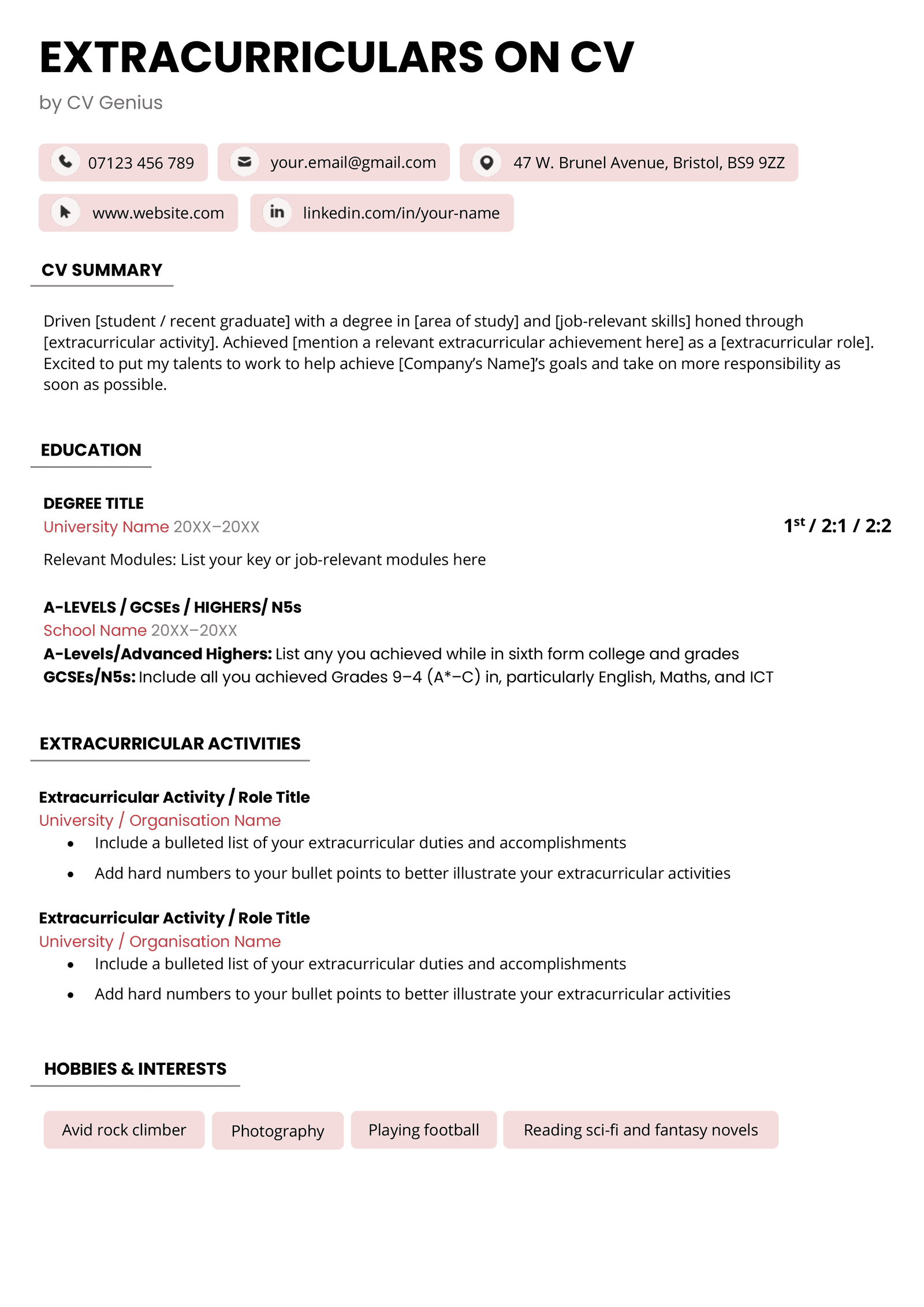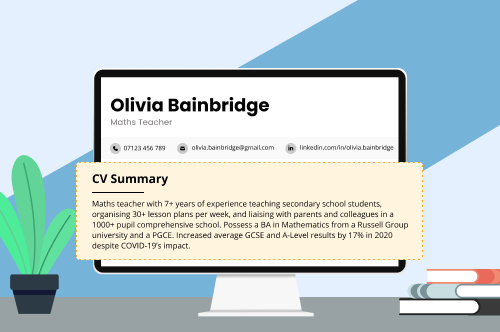When you’re applying for a job that requires more work experience than you have, putting the right extracurricular activities in your CV can get you an interview.
You should list extracurricular activities in CVs if:
So if you need to put extracurricular activities on your CV, the next step is deciding which ones to add. To help you out, we’ve compiled a list of good extracurricular activities for your CV, along with the skills that they show your potential employers and examples of how to write about them in your CV.
Already know what extracurricular activities to put on your CV? Skip to our advice on how to add extracurricular activities to your CV, or grab our CV template with pre-formatted extracurricular activities.
7 good extracurricular activities for CVs
Extracurricular activities that show employers you’d be a great hire include:
- student union positions
- sports
- performing arts
- overseas travelling
- volunteering
- clubs and societies
- job-relevant hobbies
1. Student union positions
Did you hold a student union position during your uni days? Great! Being in student leadership lets you practise and develop skills that transfer to all types of work, including the following:
Example of student union extracurricular activities in a CV
- Student union secretary: Allocated funds for various events and helped grow the budget from £5,000 to £10,000 through various fundraising events
2. Sports
Playing sports on a university team — or even casually as part of a student-organised group — is a good extracurricular activity to highlight when you write your CV. Athletics mirrors professional roles in many ways, requiring skills like those listed below:
Example of sports extracurricular activities in a CV
- Basketball club president: Organised and participated in 3 yearly tournaments, leading my 5-on-5 team from last-place finishers to two-time university champion through regular practices
3. Performing arts
Whether you studied theatre or played sappy love songs at open mics around your university town, you can include performing arts as an extracurricular activity on your CV to show employers that you’re creative and comfortable in front of a crowd.
Example of performing arts extracurricular activities in a CV
- Comedian: Performed in 3 weekly open mics and improv shows, and punched up short film scripts for friends in the film department
4. Overseas travelling
Taking a gap year or spending your summers exploring foreign countries is fun, and it also tells employers a lot about what type of employee you’d be.
Example of travelling extracurricular activities in a CV
- Travelling: Spent summers in the United States and Mexico, making a solid network of friends and adapting to each country’s working culture as a part-time customer service worker
5. Volunteering
You didn’t receive a paycheque for any voluntary work you did during school. However, the experience you earned is extremely valuable, as it could help you land a job that starts you down a rewarding career path.
Extracurricular voluntary activities like working at an animal shelter or fundraising for a politician demonstrate skills like these on your CV:
Example of voluntary extracurricular activities in a CV
- Volunteering: Saved the organisation £3,000 by convincing local taxi companies to donate drivers to deliver meals to families in need
6. Clubs and societies
Joining university clubs and societies is a good way to show employers that you’re proactive in your approach to life and work. Also, you may encounter a recruiter or manager who’s in an association with you, which increases your chances of forming a connection and getting hired.
Example of club and society extracurricular activities in a CV
- World Cinema Society: Participated in monthly film critiques which led to co-authoring 3 articles published in renowned art journals
7. Job-relevant hobbies
Any interest that you pursue during your studies can be a valuable addition to your CV — even if it wasn’t part of an organised activity. Employers want to see that you have a well-rounded life, because people who are happy outside of work make the best employees.
Example of hobby-related extracurricular activities in a CV
- Pub quizzing: Studied to compete in pub quizzes, placing in the top two in 15 competitions, and eventually wrote and hosted my own monthly quiz night
How to add extracurricular activities in your CV
The way you describe your extracurriculars — and where you put them — on your CV depends on your specific situation. Here’s everything you need to know about how to put extracurricular activities on your CV:
1. Decide where to put them
If your extracurricular activities are a main feature on your CV (i.e., they’re standing in for traditional work experience), summarise the skills you used during those activities in your personal statement.
Also, make an extracurricular activities section below your personal statement and education sections to fully describe them with role titles and dates in headers, and bulleted lists of your responsibilities and accomplishments.
If your extracurricular activities are supplemental to your relevant work experience, list those activities briefly in your education section.
Here are examples that show how to highlight your extracurriculars in these three CV sections:
2. Include examples and numbers where possible
When you add extracurricular activities in your CV, don’t just list them. Instead, add valuable information that shows employers how your extracurriculars prove you’d perform well in their open role. Such information includes:
- specific examples of your responsibilities and achievements
- hard numbers that show employers the scale of your accomplishments
Here are two examples of extracurriculars listed on a CV. The first example uses examples and data that help the employer see what the applicant is capable of doing for them. The second example is just a list of activities that doesn’t give the employer any useful information about the applicant:
Descriptive extracurricular activities with hard numbers
- Volunteering: Raised £3,500 during a fundraising campaign for CARE International
- Drama club: Collaborated with other club members to write and perform 3 plays
- Writing poetry: Published 4 poems in various university publications
Lacklustre extracurricular activities without description
Extracurricular activities: Volunteering, drama club, writing poetry
Looking for a faster way to add extracurriculars to your CV? Use an online CV creator that builds your CV sections out for you based on the details you input.
Extracurricular activities in CV template
To make putting extracurricular activities in your CV especially easy, we made this CV template with slots for your extracurriculars throughout:

Extracurricular activities in CV template (copy & paste)
Your Name
Position Title
Phone: 07123 456 789 Address: 38 Queens Road, London, NW14 9EG Email: your.name@gmail.com LinkedIn: linkedin.com/in/your-name
Personal Statement
Driven [student / recent graduate] with a degree in [area of study] and [job-relevant skills] honed through [extracurricular activity]. Achieved [mention a relevant extracurricular achievement here] as a [extracurricular role]. Excited to put my talents to work to help achieve [Company’s Name]’s goals and take on more responsibility as soon as possible.
Education
University, Location | Start Date – End Date
Degree Name (mention your degree classification for an honours degree)
Key modules: List your key or job-relevant modules here
Secondary School, Location | Start Date – End Date
A-Levels: List any A-Levels you achieved while in secondary school or college
GCSEs: Include all GCSEs you achieved A*–C (or 9–4) in, particularly English, Maths, and IT
Extracurricular Activities
Extracurricular Activity/Role Title
University/Organisation Name / Location / Start Date – End Date (or Present)
- Include a bulleted list of your extracurricular duties and accomplishments
- Add hard numbers to your bullet points to better illustrate your extracurricular activities
Extracurricular Activity/Role Title
University/Organisation Name / Location / Start Date – End Date (or Present)
- List relevant accomplishments from another extracurricular activity
- If you no longer participate in this activity, use past tense verbs to describe your experience
Key Skills
- List your relevant skills and certifications
- Include a mix of technical skills and soft skills
- Be specific (for instance, state the names of software and tools you can use)
Hobbies & Interests
- List some of your relevant or interesting hobbies (but don’t repeat any you listed in your extracurricular activities section)
- For example, mention your love of baking or solving crossword puzzles here
Answers to 3 FAQs related to CV extracurricular activities
To eliminate all doubts you may have about putting extracurricular activities in your CV, here are answers to three common questions about doing so:
1. Do hobbies count as extracurricular activities on a CV?
Yes, hobbies count as extracurricular activities on a CV. But only include hobbies that are related to the job you’re applying for.
And if you list hobbies in an extracurricular activities section, don’t repeat them in a hobbies and interests section. If you need to fill space on your CV, just write a sentence or two describing each activity.
2. Do employers care about hobbies on a CV?
Yes, employers care about hobbies on a CV. What you do in your free time gives employers a clearer picture of what type of person you are and how you’d fit into their work environment.
Also, if you can show that you pursue interests related to the type of work you do, employers will be impressed by your dedication.
3. How do you write about sports achievements on a CV?
The best way to write about your sports achievements on your CV is to focus on information related to the job you want.
For example, if the job advert you’re responding to notes that the employer is seeking someone who values teamwork, write about how you worked with your teammates to achieve a common goal, rather than emphasising your personal statistics.
Here are some good examples of how to write about sports achievements on your CV:
- Elected football team captain thanks to off-the-field teambuilding efforts that improved our morale and led to a first-place finish
- Stepped up after our star player was injured, leading the team to victory in a national cricket tournament with a batting average of 50.8 runs per match
There’s usually no need to talk about your extracurricular activities when you create your cover letter, unless you don’t have any job-related achievements yet.




